|
|
|
Sort Order |
|
|
|
Items / Page
|
|
|
|
|
|
|
| Srl | Item |
| 1 |
ID:
129269
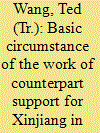

|
|
|
|
|
| Publication |
2012.
|
| Summary/Abstract |
The article offers information regarding counterpart support policy opportunities by Xinjiang. It mentions that the counterpart support work has started in accordance with the disposition of the National Xinjiang counterpart support work meeting and the central Xinjiang Work Forum, with coordination by the National development and reform commission, the nineteen provinces and cities are undertaking research work, defined work programs, and working on special plans for support work.
|
|
|
|
|
|
|
|
|
|
|
|
|
|
|
|
| 2 |
ID:
092587
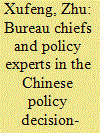

|
|
|
| 3 |
ID:
117784
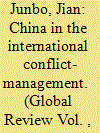

|
|
|
| 4 |
ID:
170413
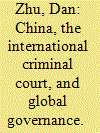

|
|
|
|
|
| Summary/Abstract |
This article explores the Chinese policies towards the International Criminal Court (ICC) in the context of global governance. Despite China’s fast-growing foreign policy competence, the level of confidence held by China in engaging with global governance systems has not yet fully transmitted to the legal institutions governing human rights issues, and the ICC is such an example. This article examines specific policy concerns of China regarding the ICC in light of China’s engagement with global governance, and some of the traditional concerns that have had an impact on that engagement. It discusses the extent to which these concerns should still be regarded as policy barriers preventing China’s full accession to the ICC in years to come.
|
|
|
|
|
|
|
|
|
|
|
|
|
|
|
|
| 5 |
ID:
130422
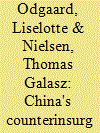

|
|
|
|
|
| Publication |
2014.
|
| Summary/Abstract |
China's counterinsurgency strategy in Tibet and Xinjiang relies heavily on hard power and imposition. Well-functioning vertical coordination in the security sector of China's political system and assimilationist nationality dynamics combine to favour the use of force against ethnic groups that do not accept the political legitimacy of China's Communist Party. Transnational links contribute to China's difficulties with implementing counterinsurgency in Tibet and help China implement its strategy in Xinjiang. Development strategies aimed at improving living standards are crowded out due to a lack of horizontal coordination between civilian and security agencies and a bias towards unitary nation-building in Chinese nationalism.
|
|
|
|
|
|
|
|
|
|
|
|
|
|
|
|
| 6 |
ID:
130416
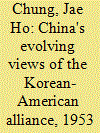

|
|
|
|
|
| Publication |
2014.
|
| Summary/Abstract |
This article reconstructs an ideational trajectory in which China's views of the Korean-American alliance evolved during the last 60 years. The article first surveys China's general policy toward alliance and alliance-making. The article then traces the evolutionary path of Chinese views in the following four periods: (1) the Cold War era (1950s-1960s); (2) transformative years (early 1970s-mid-1990s); (3) the period of a strained alliance (late 1990s-late 2000s); and (4) an era of great reversal (late 2000s-present). Principally, the article suggests that China's view of the Korean-American alliance was intense antagonism during the Cold War era, although it was significantly watered down during the transformative years of Sino-South Korean rapprochement. With the normalization of relations between Beijing and Seoul in 1992 and a decade of progressive rule (1998-2007) in South Korea, China's view encompassed some wishful thinking about a gradually diluted alliance. The strong comeback of the conservatives in South Korean politics since 2008, however, shattered such optimism and re-awoke Beijing to some cold realities. China's view of the Korea-American alliance may grow more negative in tandem with US-China relations, irrespective of the official rhetoric of sovereignty regarding alliance and alliance-making.
|
|
|
|
|
|
|
|
|
|
|
|
|
|
|
|
| 7 |
ID:
131659
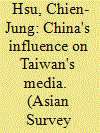

|
|
|
|
|
| Publication |
2014.
|
| Summary/Abstract |
The warming cross-Taiwan Strait relationship has allowed China greater opportunities to influence Taiwan's media. Three interrelated strategies-greater economic control over media outlets, pressure exerted on media owners, and the purchase of influential advertisements-have led to growing concerns about the erosion of press freedoms in Taiwan.
|
|
|
|
|
|
|
|
|
|
|
|
|
|
|
|
| 8 |
ID:
128280
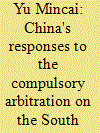

|
|
|
|
|
| Publication |
2014.
|
| Summary/Abstract |
China's responses of turning its back on the compulsory arbitration initiated by the Philippines on 22 January 2013 with respect to aspects of the South China Sea dispute between them under Article 287 and Annex VII of the United Nations Convention on the Law of the Sea and failing to participate in constituting the five-member Arbitral Tribunal raise issues of whether the arbitral process has or can be halted by China and whether China's nonparticipation is in its best interest. This article examines the legal effects of China's actions and China's policy options with respect to the arbitral procedure started by the Philippines.
|
|
|
|
|
|
|
|
|
|
|
|
|
|
|
|
| 9 |
ID:
075672
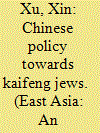

|
|
|
| 10 |
ID:
130426
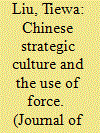

|
|
|
|
|
| Publication |
2014.
|
| Summary/Abstract |
This article reviews and explains Chinese attitudes towards the use of force in international affairs, especially from the perspective of strategic culture. The author traces back the traditional values which originated from ancient Chinese thoughts and also researches Mao Zedong's perception of war, which symbolizes the contemporary Chinese military strategic theory, and Deng Xiaoping and Hu Jintao's discourse on war thereafter, which represents the beliefs of the Chinese government after adopting the opening-up and reform policy. The case studies of the Korean War, the Vietnam War and the two Iraq Wars further explore the principles which dominate the diplomatic decision-making processes. The article concludes that China, in the predictable future, will still firmly adhere to the principles of state sovereignty, non-interference and non-use of force principles, while at the same time China will not hesitate to participate in the multilateral operations which are ratified with UN Security Council authorization and contribute increasingly to improving humanitarian situations due to its moral and political understanding of the use of force in international relations
|
|
|
|
|
|
|
|
|
|
|
|
|
|
|
|
| 11 |
ID:
119651
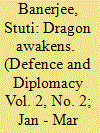

|
|
|
| 12 |
ID:
126629
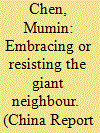

|
|
|
|
|
| Publication |
2013.
|
| Summary/Abstract |
Since 2008, President Ma Ying-jeou and his Kuomintang (KMT) government in Taiwan have adopted the policy of seeking greater economic cooperation with China in exchange of reducing confrontation across the Taiwan Strait. By endorsing the 'One China' principle, the KMT government successfully resumed dialogue with Beijing and signed 18 agreements, ranging from allowing Chinese tourists to visit Taiwan to establishing a closer economic partnership. Yet President Ma's self-claimed achievements in cross-strait peace received severe criticisms from the opposition Democratic Progressive Party (DPP), which accused KMT's pro-China policy as selling out the democratic Taiwan to an authoritarian regime. This article examines the on-going debates between the ruling KMT and opposition DPP about proper strategies towards China, and how such debates make it unlikely for Taiwan to form an effective policy on cross-strait affairs. The differences between KMT and DPP on their respective China policies have led to prolonged distrust between both parties, and between DPP and Beijing. Facing an increasingly powerful China, both parties are short of better ideas to convince voters that their current policy will effectively secure Taiwan's sovereign status or will be beneficial to enhancing Taiwan's interests in the long term.
|
|
|
|
|
|
|
|
|
|
|
|
|
|
|
|
| 13 |
ID:
130980
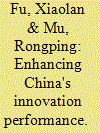

|
|
|
|
|
| Publication |
2014.
|
| Summary/Abstract |
Transforming China into an innovation-driven economy has been one of the top priorities of the Chinese Government. This paper examines the policy choices involved in the extended national innovation performance framework for creating an open innovation system. Innovation capabilities, incentives and institutional frameworks are examined. The paper argues that China should continue to increase its investment in R&D and in education, and that there should also be an attempt to strengthen the incentive system at the macro, meso and micro levels. This strengthening may include reforms to: release the power of competition and guide resources towards innovative sectors; adopt appropriate human resource management, such as appraisal and remuneration systems; create effective policies for research funding management; and evaluate the efficiency of research to encourage the creativity of researchers, managers and employees. The paper also discusses the space for industrial policy in the 21st century.
|
|
|
|
|
|
|
|
|
|
|
|
|
|
|
|
| 14 |
ID:
129263
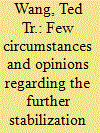

|
|
|
|
|
| Publication |
2012.
|
| Summary/Abstract |
Speech made by Comrade Jiang Zemin at a symposium held during the Sixth Plenary Meeting of the Thirteenth Chinese Party Congress. Today we invite comrades from ethnic border regions and from the Shenyang, Beijing, Lanzhou, and Chengdu military districts who are participating in the present central (committee) plenary meeting to attend a symposium, and we also invite comrades from the various de- partments of the Party Center and the relevant state council departments participating in the plenary meeting to attend in order to study the matter of further stabilizing the ethnic border regions. This indicates that the Party Center, the state council, and the Central Military Commission show great concern for and attach importance to the work in the ethnic border regions
|
|
|
|
|
|
|
|
|
|
|
|
|
|
|
|
| 15 |
ID:
129574
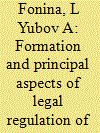

|
|
|
|
|
| Publication |
2014.
|
| Summary/Abstract |
The article deals with the main aspects and problems of the legal regulation of religious activity in the PRC and outlines the essence of the basic legislative acts of the country, touching on policy toward religion, as well as corresponding rules and instructions and their political meaning.
|
|
|
|
|
|
|
|
|
|
|
|
|
|
|
|
| 16 |
ID:
093235
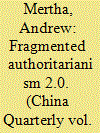

|
|
|
|
|
| Publication |
2009.
|
| Summary/Abstract |
Traditional analyses of political liberalization in China focus on elections or other facets of democratization. But they cannot account for the fact that although China remains authoritarian, it is nevertheless responsive to the increasingly diverse demands of Chinese society. I argue that the rules of the policy-making process are still captured by the fragmented authoritarianism framework, but that the process has become increasingly pluralized: barriers to entry have been lowered, at least for certain actors (hitherto peripheral officials, non-governmental organizations and the media) identified here as "policy entrepreneurs." With policy change as the variable of interest, I compare three cases of hydropower policy outcomes. I argue that policy entrepreneurs' ability to frame the issue effectively explains variation in hydropower policy outcomes. I then extend these findings to an unlikely policy area, international trade, specifically, the 2001-06 Sino-EU trade talks over child-resistant lighter safety regulations.
|
|
|
|
|
|
|
|
|
|
|
|
|
|
|
|
| 17 |
ID:
124897
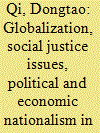

|
|
|
|
|
| Publication |
2013.
|
| Summary/Abstract |
Taking a broader perspective to explore the relations between Taiwan's globalization, social justice issues and the DPP's political and economic nationalism, this study aims to understand the DPP's resurgence in local elections since 2008, and its defeat in the 2012 presidential election. Increasing capital flight from Taiwan to mainland China has contributed to Taiwan's rising unemployment and income inequality. Less privileged Taiwanese, having stronger nationalist sentiments and concerns about the Taiwanese government's open-door China policy, switched their support from the KMT to the DPP during the DPP administration of 2000-2008. Since 2008, the DPP's better balance between its political and economic nationalism has been instrumental in securing popular support, especially at the local level. Nevertheless, in the 2012 presidential election, the DPP failed to convince the majority of Taiwanese voters that its moderate political nationalism could maintain the significantly improved cross-Strait relations vital for Taiwan's economic revival under the current bleak world economic conditions.
|
|
|
|
|
|
|
|
|
|
|
|
|
|
|
|
| 18 |
ID:
128429
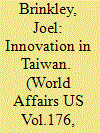

|
|
|
|
|
| Publication |
2014.
|
| Summary/Abstract |
Taiwan's president, Ma Ying-jeou, sat in a low leather chair looking out over the vast presidential conference room of his Taipei office. On the wall behind him hung a portrait of Sun Yat-sen, the Chinese icon who is credited with the revolution a century ago that ended two thousand years of imperial rule. Under Ma's feet lay a light blue carpet festooned with white representations of ocean waves. Overhead, white cloth, styled like ship sails, covered the ceiling lights-all of it intended to represent Taiwan's journey away from mainland China. Asian conference rooms are unlike those in the West. There's no mahogany conference table. Instead, plush chairs are arranged in a U shape. And the conference leader, in this case President Ma, sits at the center with his conferees to his left and right-university professors, think tank leaders, and government officials from Asia and the West who were there for a conference on the East China Sea debate between Taiwan, China, and Japan.
|
|
|
|
|
|
|
|
|
|
|
|
|
|
|
|
| 19 |
ID:
112184
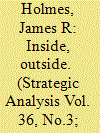

|
|
|
| 20 |
ID:
130271
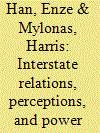

|
|
|
|
|
| Publication |
2014.
|
| Summary/Abstract |
Why do multi-ethnic states treat various ethnic groups differently? How do ethnic groups respond to these state policies? We argue that interstate relations and ethnic group perceptions about the relative strength of competing states are important-but neglected-factors in accounting for the variation in state-ethnic group relations. In particular, whether an ethnic group is perceived as having an external patron matters a great deal for the host state's treatment of the group. If the external patron of the ethnic group is an enemy of the host state, then repression is likely. If it is an ally, then accommodation ensues. Given the existence of an external patron, an ethnic group's response to a host state's policies depends on the perceptions about the relative strength of the external patron vis-à-vis the host state and whether the support is originating from an enemy or an ally of the host state. We present five configurations and illustrate our theoretical framework on the eighteen largest ethnic groups in China from 1949 to 1965, tracing the Chinese government's policies toward these groups, and examine how each group responded to these various nation-building policies.
|
|
|
|
|
|
|
|
|
|
|
|
|
|
|
|
|
|
|
|
|